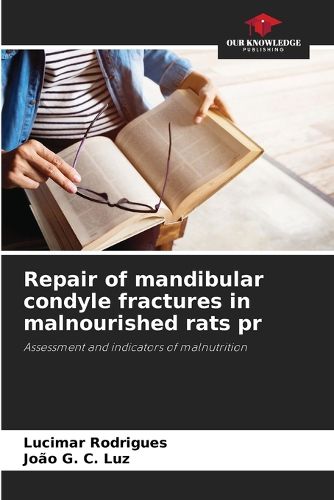Readings Newsletter
Become a Readings Member to make your shopping experience even easier.
Sign in or sign up for free!
You’re not far away from qualifying for FREE standard shipping within Australia
You’ve qualified for FREE standard shipping within Australia
The cart is loading…






This study assessed repair and malnutrition indicators in rats submitted to unilateral mandibular condyle fracture and protein malnutrition (8% protein with vitamin and mineral supplements). 45 adult male Rattus norvegicus Wistar were used, divided into 3 groups of 15 animals: fractured group, subjected to condyle fracture, with no change in diet (23% protein); fractured malnourished group, subjected to hypoprotein diet for 30 days and subsequent condylar fracture; malnourished group, with previous hypoprotein diet for 30 days, maintained until the end of the experiment, without condyle fracture. The amount of feed and water ingested was documented, as well as weight and the coefficient of food efficiency (CEA). Biochemical blood tests, cephalometric measurements using radiographs of the maxilla and mandible, histological studies and statistical analyses were carried out. It was concluded that mandibular condyle fracture in rats with protein malnutrition led to negative changes in total protein, albumin and serum calcium values, leukocytosis, as well as compromised bone callus formation and induced fibrocartilage atrophy and fibrous ankylosis.
$9.00 standard shipping within Australia
FREE standard shipping within Australia for orders over $100.00
Express & International shipping calculated at checkout
This study assessed repair and malnutrition indicators in rats submitted to unilateral mandibular condyle fracture and protein malnutrition (8% protein with vitamin and mineral supplements). 45 adult male Rattus norvegicus Wistar were used, divided into 3 groups of 15 animals: fractured group, subjected to condyle fracture, with no change in diet (23% protein); fractured malnourished group, subjected to hypoprotein diet for 30 days and subsequent condylar fracture; malnourished group, with previous hypoprotein diet for 30 days, maintained until the end of the experiment, without condyle fracture. The amount of feed and water ingested was documented, as well as weight and the coefficient of food efficiency (CEA). Biochemical blood tests, cephalometric measurements using radiographs of the maxilla and mandible, histological studies and statistical analyses were carried out. It was concluded that mandibular condyle fracture in rats with protein malnutrition led to negative changes in total protein, albumin and serum calcium values, leukocytosis, as well as compromised bone callus formation and induced fibrocartilage atrophy and fibrous ankylosis.